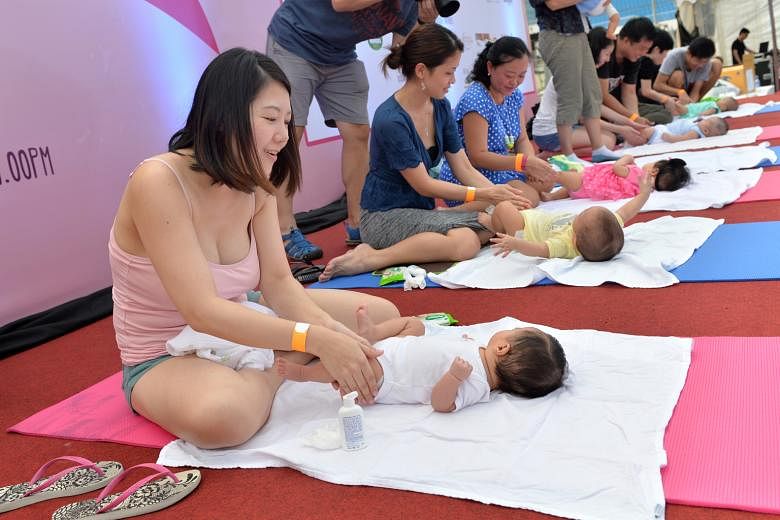Companies are unlikely to follow the public service's move, announced on Thursday, which gives public servants more unpaid infant-care leave.
That was the assessment of the Singapore National Employers Federation (SNEF) and the Association of Small and Medium Enterprises (Asme).
They cited several reasons, including the timing.
"The announcement caught us by surprise because there is a better time to do this, given the current revenue-declining environment for businesses," said Mr Kurt Wee, president of Asme. "We are not against family-support measures, but productivity is lagging behind wage increases and businesses are struggling for survival," he added.
In 2015, wages in the private sector grew by 4 per cent while labour productivity registered a negative 0.1 per cent.
-
How civil servants can use extra weeks of unpaid infant-care leave
-
The additional four weeks of unpaid infant-care leave is to be taken in a continuous period, said the Public Service Division (PSD), in response to queries by The Straits Times on its use.
"However, it can be staggered if an officer's supervisor is agreeable," said the PSD spokesman.
When asked how much "advance notice" is needed, the spokesman said it "should be reasonable to allow the employer to find alternative covering arrangements for the officer when he or she is away".
With the latest pilot scheme, married couples who are both public officers can together enjoy up to 30 weeks of paid and unpaid leave after the child is born.
This consists of 16 weeks of paid maternity leave, two weeks of paid paternity leave, a week of paid childcare leave for each parent and five weeks of unpaid infant-care leave for each parent.
PSD did not reveal the take-up rate for unpaid infant-care leave last year. It said that the take-up rate for paternity leave in the civil service last year was 91.4 per cent.
As for concerns about pushback from colleagues and bosses over the use of such leave, as well as worries about career prospects and bonuses, the PSD spokesman said: "We assess our officers based on their performance and work contributions in the year.
"This is no different from how officers are currently assessed if they take maternity leave or unpaid infant-care leave."
Janice Tai
According to an Asme survey last year of 350 enterprises, about 85 per cent of them cited manpower cost as the key contributor to rising business costs and they expect this trend to continue this year.
Besides productivity, there is the issue of capacity.
"Employers are unlikely to offer more leave because small companies are unable to accommodate it, and they are not in favour of creating another benefit entitlement for one category of employees," said SNEF executive director Koh Juan Kiat. "It is also important to note that both employers and employees need more time to adjust to the other extended leave benefits that come into force this year," he added.
Fathers whose children are born from January this year can get two weeks of mandatory paid paternity leave, up from the previous one week. Working mothers can also share up to four weeks of their 16-week paid maternity leave with their husbands from July this year.
Singapore Human Resources Institute president Erman Tan said that offering workers more unpaid leave need not necessarily disadvantage businesses.
"Staff motivation and aspiration have changed over time and they desire quality family time beyond the bread-and-butter issues," he said.
"If they are better supported in integrating work and family, happier and more motivated workers mean better productivity," he added.
When news about the extended infant-care leave went out on Thursday, netizens such as Ms Angela Tan aired their concerns on The Straits Times Facebook page.
They worry about colleagues and bosses not being receptive to people who take such leave, and the impact their extended absence will have on their careers and bonuses.
Supervisors in the public service have to say "yes" to all applications, as long as reasonable notice is given (see background story).
The public-service pilot scheme, which will run for three years from July, gives an employee five weeks of unpaid infant-care leave, or an extra four weeks.
Public servants and their spouses are guaranteed up to about six months of parental leave per couple, comprising paid maternity and paternity leave, paid childcare leave and unpaid infant-care leave.
Women's groups such as the Association of Women for Action and Research (Aware) cheered the move to give parents more unpaid leave.
"The World Health Organisation recommends six months of exclusive breastfeeding for infants, so this move can also help to align the period of leave available with infants' health needs," said Aware's head of advocacy and research, Ms Jolene Tan.
"The Government should monitor the gender breakdown of the take-up of such leave and consider implementing structures that ensure a certain proportion of the leave is taken by men, as in the case of Scandinavia, where shared parental leave has a component which only men can take," she added.
Only four in 10 eligible fathers used the full week of paid paternity leave in 2015. Yesterday, it was revealed in Parliament that among the fathers of the 41,253 children born last year, about 11,300 of them have applied for paid paternity leave so far. Of these applications, 16 per cent are from the civil service.


